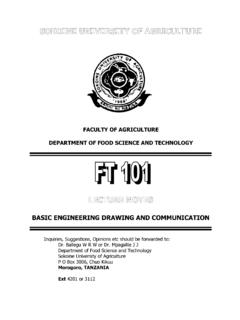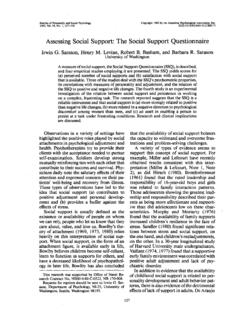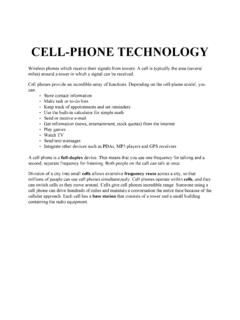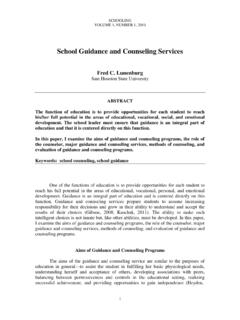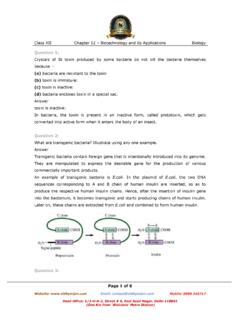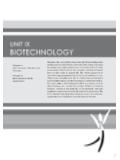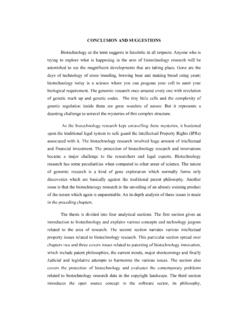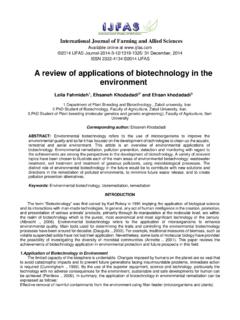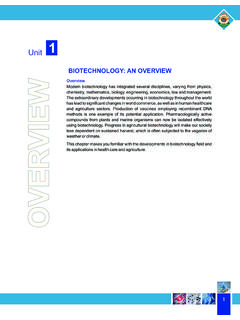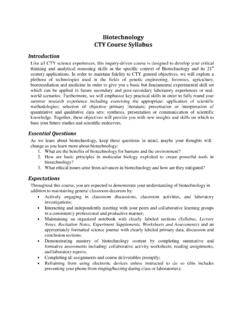Transcription of BIOTECHNOLOGY AND ITS APPLICATIONS IMPLICATIONS …
1 BIOTECHNOLOGY AND ITS APPLICATIONS IMPLICATIONS FOR ghana introduction BIOTECHNOLOGY is regarded in ghana as a promising technology for the improvement of the living conditions of the population, for increase in food production and for providing better health delivery. Nonetheless, the use of BIOTECHNOLOGY is still at an embryonic stage in the West African sub region, particularly in the case of genetic manipulation. This report describes the distinct role of BIOTECHNOLOGY in sustainable development and examines the opportunities and challenges that the application of BIOTECHNOLOGY offers ghana in the sectors of agriculture, industry, health and environment.
2 The report covers; Fundamental issues in BIOTECHNOLOGY Status of BIOTECHNOLOGY in ghana APPLICATIONS of BIOTECHNOLOGY (Agriculture, Industry, Health and Environment) Recommendations FUNDAMENTALS OF BIOTECHNOLOGY In the year 1919, Hungarian agricultural engineer Karl Ereky foresaw a time when biology could be used for turning raw materials into useful products. He coined the term BIOTECHNOLOGY to describe that merging of biology and technology. Ereky s vision culminated in what is now referred to as BIOTECHNOLOGY . As an academic discipline and technological platform, many scholars and connoisseurs abound in the field of BIOTECHNOLOGY hence the several definitions that one may have to contend with.
3 The Convention on Biological Diversity defines BIOTECHNOLOGY as any technological application that uses biological systems, living organisms or derivatives thereof, to make or modify products or processes for specific uses . Van Beuzekom and Arundel, (2006) define BIOTECHNOLOGY as the integration of natural sciences and engineering in order to achieve the application of organisms, cells, parts thereof and molecular analogues for products and services. They appreciate BIOTECHNOLOGY as a versatile and key area which has greatly impacted various technologies based on the application of biological processes in manufacturing, agriculture, food processing, medicine, environmental protection and natural resource conservation.
4 Van Beuzekom and Arundel, (2006) also identified BIOTECHNOLOGY as the new wave of technology that accounts for 3 | K o f i A n n a n C o m m i t t e e R e p o r t o n B i o t e c h n o l o g y a n d i t s A p p l i c a t i o n s I m p l i c a t i o n s f o r G h a n a, 2 0 1 3 the dramatic improvements in various sectors of national economies, including production of drugs, vitamins, steroids, interferon, products of fermentation used as food or drink, energy from renewable resources and waste.
5 As well as genetic engineering applied on plants, animals and humans. Indeed, BIOTECHNOLOGY provides novel opportunity for sustainable production of existing and new products and services. The figure below highlights the resourcefulness of APPLICATIONS of BIOTECHNOLOGY . (Adapted from Sukumaran Nair 2006) 4 | K o f i A n n a n C o m m i t t e e R e p o r t o n B i o t e c h n o l o g y a n d i t s A p p l i c a t i o n s I m p l i c a t i o n s f o r G h a n a, 2 0 1 3 BIOTECHNOLOGY IN MEDICINE AND HEALTH A variety of biotechnological techniques are used in modern drug development and medical treatment.
6 In some cases, for example, genetic engineering is the basis for both the process and the product. In others, gene technology is used simply as one tool in the development of new products such as pharmaceuticals. BIOTECHNOLOGY enables scientists to understand genetic variability in humans and this leads to healthcare benefits for individuals who are genetically susceptible to certain diseases. Genetic screening and analysis, for example, makes it possible for tailor- made treatment of diseases. Gene therapy involves the genetic engineering of a patient s genetic code to remove or replace a mutant gene that is causing disease and this contributes substantially to modern health delivery across the world.
7 According to a 2002 UNCTAD report addressing Key Issues in BIOTECHNOLOGY , the first BIOTECHNOLOGY product approved for human health care was synthetic human insulin, which came onto the market in the United States in 1982. Since then, more than 170 biotechnologies related drugs and vaccines have been approved by the United States Food and Drug Administration, of which 113 are currently on the market. Another 350 BIOTECHNOLOGY medicines, together targeting over 200 diseases, are in the later stages of development. Amongst those approved during 2000 are medicines to treat pneumococcal diseases in children, diabetes, cancer and hemophilia.
8 Keener et al from the North Carolina State University, Food science Department in their undated publication in BIOTECHNOLOGY and its APPLICATIONS reported that biotechnical methods are now used to produce many proteins for pharmaceutical and other specialized purposes. A harmless strain of Escherichia coli bacteria, given a copy of the gene for human insulin, can make insulin. As these genetically modified (GM) bacterial cells age, they produce human insulin, which can be purified and used to treat diabetes in humans.
9 Microorganisms can also be modified to produce digestive enzymes. In the future, these microorganisms could be colonized in the intestinal tract of persons with digestive enzyme insufficiencies. Products of modern BIOTECHNOLOGY include artificial blood vessels from collagen tubes coated with a layer of the anticoagulant heparin. AGRICULTURAL BIOTECHNOLOGY The field of agriculture is one with largest impact of BIOTECHNOLOGY . The following paragraphs discuss some of the monumental impact on agriculture resulting from the use of BIOTECHNOLOGY . 5 | K o f i A n n a n C o m m i t t e e R e p o r t o n B i o t e c h n o l o g y a n d i t s A p p l i c a t i o n s I m p l i c a t i o n s f o r G h a n a, 2 0 1 3 Bioferlizers: These are substances which make use of microorganisms to fertilize the soil.
10 These fertilizers are not harmful to crops or other plants like the chemical fertilizers. They are taken from animal wastes along with microbial mixtures. Micro-organisms are used to increase the level of nutrients the plants. They let the plant grow in a healthy environment and protect them from getting any disease. They are also environment friendly and do not cause pollution in any sort. They are not costly and even poor farmers can make use of them. BIOTECHNOLOGY advances allow for specific changes to be made quickly in plants and animals breeding which enhances their traits to get new and different varieties to them through traditional methods like cross-pollination, cross-breeding and grafting.
